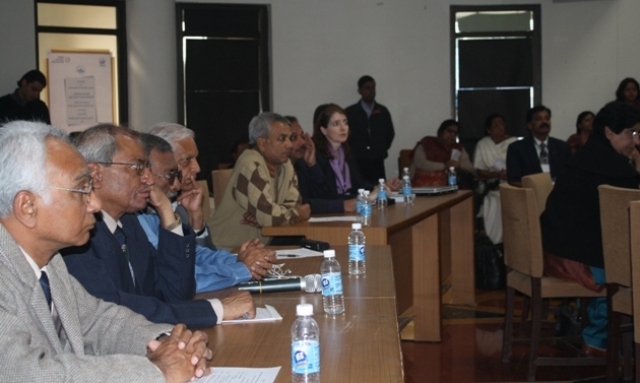Attending today's technology sessions, I couldn't help thinking about what Carl Sagan once remarked about science and technology. He noted,
“We've arranged a civilization in which most crucial elements profoundly depend on science and technology.”
And rightly so! Most of our present day problems warrant an understanding of the science and developing appropriate solution to address it. This was reflected well in P.S Datta's presentation on the study of groundwater using isotope fingerprinting.
The Working Group Meeting setup for the day, had arrived at its list of technological issues to be addressed, and they had their recommendations in place too. The issue aren't any different from what yesterday's group came up with. The recommendations looked different though!
Technological Issues:
- Rainwater harvesting techniques for different geo-hydro-thermo regions
- Risk management in rainwater harvesting
- Capacity assessment for rainwater harvesting
- Innovative water storage techniques
- Groundwater recharge
- Conventional water-borne sanitation system
- Water Storages and Wetlands
Recommendations:
- Focus should be centralized systems in the urban areas with an element of decentralized system too.
- There are good three tier model of running water supply system in Gujarat right from infrastructure to distribution network to village level distribution of water supply. Working well in about 3000 villages. Serves a good model for replication.
- For Operation and Maintenance Pani Panchayats (sub committee of PRIs) are playing a crucial role. There is a well laid tariff system in Gujarat which also needs to be replicated.
- For designing water harvesting systems there should be proper study of geology, soil type, and rain fall patterns.
- Focus should be on managing aquifers and incentive based scheme should be introduced for managing local resources.
- There is a need to develop standards for aquifers which should form benchmarks for recharging.
- Role of NGO need to be increased
- Critical aquifer protection measures need to be introduced by protecting the land use patterns.
- Natural drains need to be protected from sewerage.
- Community driven water harvesting techniques for different hydro-geological regions must be site-specific, data driven and need-based.
- Risk minimization in rainwater harvesting systems can be ensured through continuous quality monitoring. Public awareness needs to be generated.
- Regional Aquifer Analysis System (RAAS) through participatory approach among scientists, engineers, communities is essential for having sustained RWH and artificial recharge (AR) of ground water (GW) systems.
- Isotope fingerprinting is recommended for basin level analysis of GW resources.
- Participatory Integrated Water Resources Management (IWRM) approach can achieve drinking water security.
- Industries are required to adopt techniques which reduce their water requirement as well as eliminate the pollution of water bodies.
- Traditional and viable RWH techniques need to be revived.
- Technological and social aspects need to be addressed for reducing water conflicts.
- Ecological aspects in totality need to be accounted in water planning.
- 4-way partnership among the experts, community leaders, govt. agencies and funding agencies can achieve successful RWH programs.
- Innovative water storage techniques need to be adopted.
The activity levels around the posters display area, exhibition and the venue appears to be riding high today! With only half a day through... here is what we see. The photos are contributed by Tushar Gupta, volunteer with India Water Portal.
P.S.Dutta, Nuclear Research Laboratory, IARI
Rajendra Singh, Tarun Bharat Sangh

A section of audience
Bioremidiation Workshop panel
Asit Neema, Foundation for Greentech Environmental Systems, New Delhi
Durjoy Chakraborty, CGWB
Bioremediation Workshop
Farhad Contractor, Founder, Sambhaav Trust, Rajasthan
Volunteers at WHSC
Sagarika Kumar
Siva Kumar, Anerobic MBR
Rohit Agarwal, Remote Sensing Agency, Lucknow
V.R Desai Presenting his poster on Scientific Promotion of RWH
Devasena M, Ph.D candidate, IIT Madras
Deeksha Ranjan explains using rice polish as a medium to reduce Arsenic pollution
Prof. Indumati, IIT Madras, presenting a new design of radial wells to extract fresh water in coastal regions avoiding the upcoming of saline water into fresh water aquifers
I was sure not to miss this one out! The most important part of the whole event, security! These are some amazing folks, for whom the conference subject is of same importance as to any one of us, only difference being the way they participate.
Inaugural Session of the conference
Bharat Sharma speaking on managing risk and low productivity of rain fed agriculture
Pre conference proceedings released by D.K. Chadha and Sanjay Dhande
Participants at WHSC
A section of audience
Prof. Ramaswamy Iyer
Exhibition and Posters
WWF India's For a Living Ganga booth
Sulabh International's booth
Kids from VSEC, Kidwai Nagar presenting their model to visitors
Posters put up in the premises
Posters in the premises
/articles/recommendations-working-group-meeting-technological-issues-related-groundwater-day-2